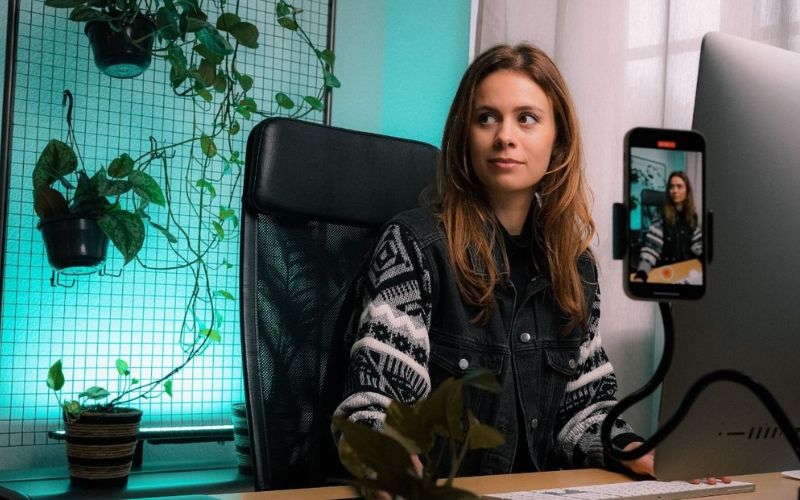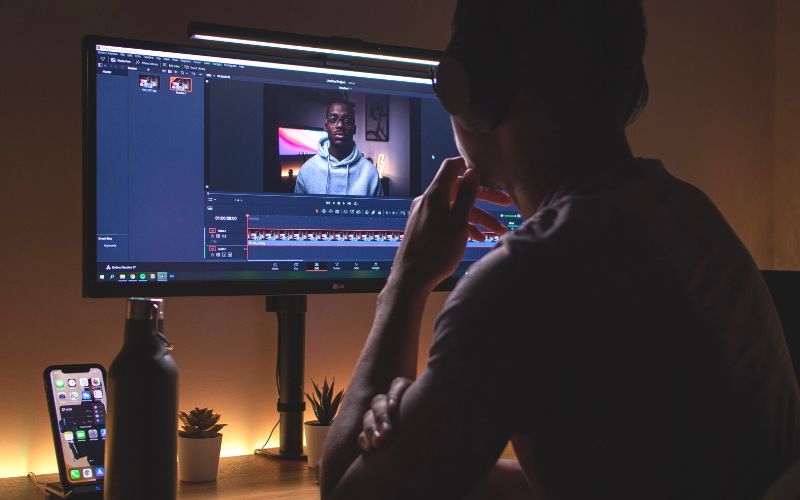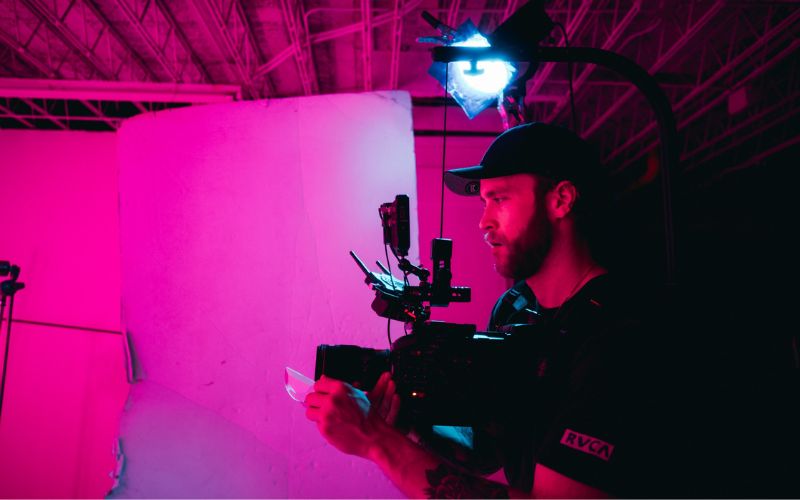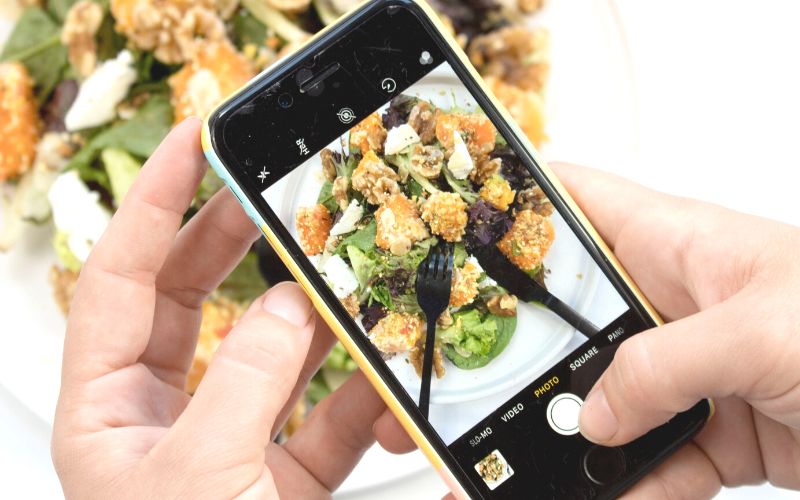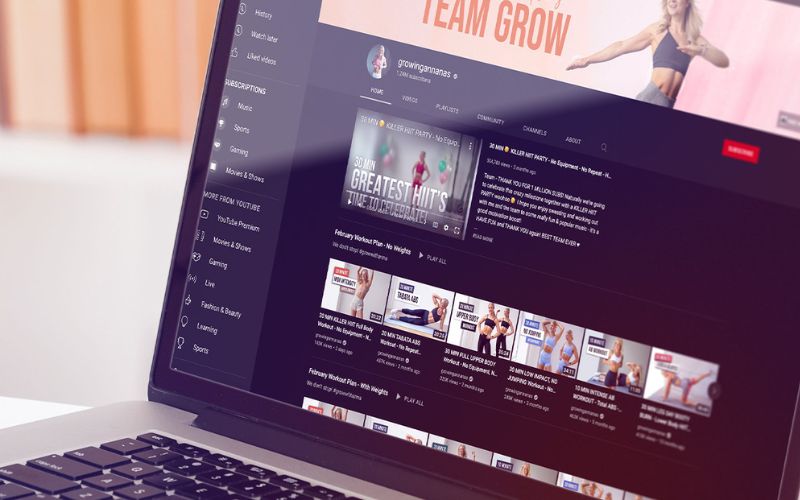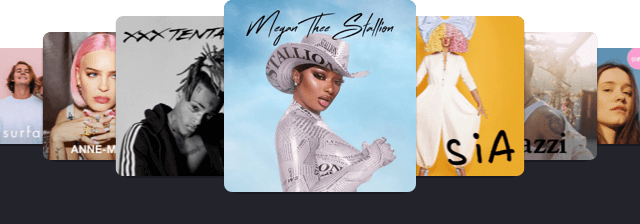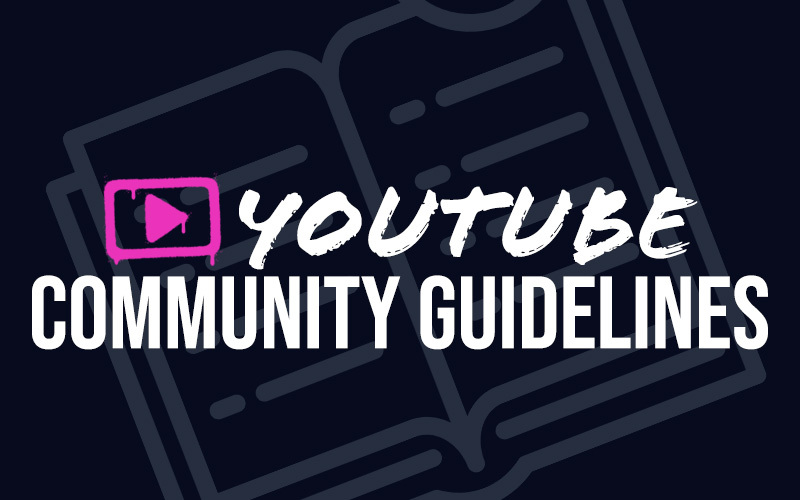These days we are glued to our screens more than ever before, and the demand for digital content is growing rapidly. More and more businesses are looking for influencers, bloggers, vloggers, social media managers and any other form of content creator to help them grow their brand and increase their conversions. But, what is a content creator? What are a content creator’s responsibilities? Is it difficult to become a successful content creator? And what can you earn as a content creator? Read on to find out the answers to these questions, as well as the best tips on how to become a content creator in today’s world!
What is a content creator?
First things first, what is a content creator? Content creators are people who (funnily enough) create content. More specifically though, they make engaging, interesting and/or educational content for digital channels such as social media or websites.
They aim to provide value by matching the search intent of consumers through design, copywriting, production, and other forms of media.
Although the term ‘Content creator’ can be used for anyone who creates content for any medium, it usually refers to social media content creators like YouTubers or “influencers”. That’s what we mean by it as well when we talk about content creators here at Lickd. However, let’s take a look at the two most common types of creators…
Types Of Content Creators
Individual Creators / Social Media Influencers
These days, everyone has a favourite influencer. Individual creators, or influencers, are most commonly found across social media platforms like Instagram, TikTok, Snapchat, YouTube, etc.
Individual content creators primarily work to build a large community of followers that can be monetised at some point.
With that being said, not all content creators are social media influencers.
Content Publishers
Many businesses employ content creators as part of their broader digital marketing strategy, which includes content such as articles, blogs, copy for adverts, and other media.
Content publishers focus mainly on creating content that boosts a company’s digital exposure and traffic to their sites to make more sales.
Whether you’re an individual or company content creator, the end goal is always to create inspiring, entertaining, or educational material that engages individuals or businesses.
What is involved with being a content creator?
So, what does a content creator do?
Depending on the specific line of work and the target audience, what one content creator does can be entirely different to another. A content creator could produce materials across various platforms such as videos, social media posts, blog articles, podcasts, infographics, and more.
To the general public, it’s not always obvious what a content creator actually does. Sometimes they see some lazy teen who films a video, posts it to YouTube and then does nothing for the rest of the day. But that’s completely wrong. Content creators need to have a varied skill set and work hard in order to pull off everything needed to make just one piece of content. For a moment, imagine what might need to go into posting a YouTube video. It’s not just filming the video, it’s also editing it, making the thumbnail, writing the title, the description, promoting it on social media, and more.
Let’s dive a little deeper into the most common skills any content creator may need:
Videography
TikTok, Instagram, and Youtube videos are great ways for content creators to connect with their followers, produce exciting content and even promote products and services through video reviews and demonstrations.
Content ideation
This is one of the most important tasks and skills of content creators; coming up with ideas for engaging content that’s relevant to their niche or audience. Fresh, exciting ideas are crucial to driving the best results.
Copywriting and research
Copywriting involves creating various written content, including social media captions, compelling titles, YouTube descriptions, long blog posts, and even summarising year-long research papers into readable, engaging copy.
Design and visuals
Whether for a website, social media post, or video, quality photography and professional, eye-catching designs are crucial to the look of your content. Just think about how much more likely you are to click on a YouTube thumbnail if it has a beautiful image and professional eye-catching design than if it was a blurry stock image.
Editing
When it comes to copywriting, videography and design, editing is an essential skill for creating appealing content. Content creators need to be capable of producing flawless work without typos and avoid lengthy content that could bore the audience.
SEO
Website content writers use SEO (search engine optimization) to get their pages to rank high in search engines for the best visibility. SEO content creators also use video and image SEO to improve their rankings.
Project management
Content producers often also work to manage content creation projects. This is more common with brands or with bigger content creators where they either have a lot of moving parts or have hired a team to help them execute their ideas.
Brand analysis
Brand analysis involves evaluating a brand’s content from every perspective, including its design style, tone of voice, strengths, weaknesses, how they compare to the competitors, and how it can improve its digital marketing strategies. This is obviously more common within brands and businesses but can also be the case where individual content creators take on a bigger collaboration with a brand or even become a brand ambassador.
Promotion
The last aspect of content creation involves ensuring that the content reaches the relevant audience as effectively as possible. This includes subscription emails, PR pitches, link building and social engagement.
What is the goal of a content creator?
Content creators aim to create high-quality content that is engaging and generates the most traffic, followers, and leads possible.
Like digital marketers, content creators also use data and analytics to see what works and what doesn’t in order to fine-tune their content strategies and produce the best results.
What is required to become a content creator?
A common question is, “Do content creators need to have a degree?”.
No, a degree isn’t necessary to be a successful content creator. It can be helpful in some cases, for example a marketing degree could help you massively, but creating content is all about tapping into your creative side, doing what you love and documenting it through words or visuals. This makes it a perfect career path for those who just want to get stuck in, with or without a (relevant) degree.
Coming up soon in this article, we’ll list exactly what you need to get started as a content creator, but really it’s about giving it a go and learning as you go along. Anyone can become a content creator with the right approach.
However, when it comes to earning money as a content creator, that’s where it gets a bit trickier. You’ll need to keep at it until you’ve grown enough to monetize your content. For example through monetising your YouTube channel or ad revenue from ads on your blog. At this stage, you’ll probably also be able to start going after brand deals. We explain all about brand deals how to get them in this article so give that a read if you’re interested, but generally how this works is that a brand would pay you to mention their brand, product or service in your content. Common examples of this include a beauty YouTuber being paid by a shampoo brand to show and mention their new product on camera, or a food blogger being paid to recommend a certain brand or ingredient.
To obtain these types of sponsorships, you’ll need to have some experience, a sizeable & targeted audience, and examples of your content.
If you have a big following on a social media platform, you already have a foot in the door. Many brands and companies are eager to pay creators to feature their products and will even reach out to you to strike a deal.
How much money do content creators make?
A content creator’s income depends on various elements, like the type of creator they are, the type of content they create, the size of their following, and the brands they work with.
Individual content creators can make anywhere from $0 to millions of dollars every year. For example on YouTube, a small content creator that has only just started out and isn’t yet monetized probably won’t be earning anything yet, but stick it out and you could be like Jeffree Star who reportedly earned $17 million in 2019. Read this article to see how to make money on YouTube, and this one to see how much YouTubers make and where it comes from.
On the other hand, if you work in-house for a brand or business, you’ll likely be looking at a lower, but more stable salary like that of your average marketing employee. Freelance content creators usually work at an hourly rate, which can be anywhere between £40 to £130 per hour. Or they could charge their clients per piece of content, which could be around £100 or more for a single piece, depending on their skills and how sought-after they are.
Use our Social Income Calculator to see how many views and followers you will need to give up the day job and become a content creator on social media.
How to become a content creator
There are no hard and fast rules for becoming a content creator. However, the most successful content creators will produce regular, engaging, high-quality content for their audience.
Are you thinking of becoming a content creator?
Below are six tips for becoming a successful content creator in today’s digital world.
Six steps to becoming a successful content creator
1. Acquire the necessary skills
As a content creator, you will need to have the necessary skills to create content your target audience wants to see. This could be through studying courses, working as an intern, or self-teaching.
Certificate or degree:
As we said earlier, you don’t need a degree to become a content creator, but it can come in handy. Nowadays, most universities and courses offer digital marketing or content creation courses. Since there are several different forms of digital content and paths to choose from as a content creator, it’s best to first get an idea of the content creation you are most interested in before enrolling in a course.
Some of the best degrees to become an influencer or content creator include:
- Marketing
- Journalism
- Business
- Public Relations
- English
When it comes to content production, videography, and design, paths to study are usually more clear.
Internships
If you’re interested in working in-house for a brand or business, or want to gain experience making content before you set out on your own, then a fantastic way to do so is through an internship.
At the very least, working as an intern will help you to gain experience and learn tricks of the trade. It’s also often the case that an internship will lead to full-time positions or other great opportunities.
Self-taught
Thanks to the internet, all the information and resources you need to become a content creator are right at your fingertips.
You can educate yourself and learn valuable skills through free learning sites, articles (like the one you’re reading right now!) as well as by watching videos and listening to podcasts from successful content creators.
2. Choose your niche
It’s essential that you find your expertise and a niche to focus on if you want to set yourself apart from other content creators.
Ask yourself a few questions to get a clearer idea: are you more interested in editing images and doing content marketing? Do you want to work for a brand or yourself?
When choosing your niche, think of your ideal audience and how you could connect with them through providing valuable content. For example, your audience niche could be fashion, beauty, gaming, or health and fitness. Although try to narrow it down even further than that!
One of the best things to do is stop and ask yourself “what am I particularly good at that I’d like to share with others?” or “what do I really enjoy?”. If you really enjoy fitness and you’re exceptionally good at coming up with your own at-home HIIT workouts, then that would be a great niche for you to create content around. It’s important to define exactly what niche you want to be in, because ‘fashion’ content could be about styling bought items, but equally it could be about making your own clothes. These two types of content will have pretty different audiences, so focus on where your strengths lie.
If you’re multi-talented and just want to do it all, just pick a small niche to begin with so you can start to grow a following, then branch out gradually when your channel takes off.
3. Take on new challenges
Always make sure you are aware and up-to-date with what is happening around you as you work, intern, or network so that you are always ready to grab any opportunities that come your way.
This will allow you to learn new valuable skills, collaborate with others, and you might even discover a unique aspect of content creation that you weren’t previously aware of.
4. Start your own brand
Personal branding is essential, especially if you’re an independent content creator. Creating a personal brand will go hand-in-hand with creating content and will ensure that your audience will recognise you wherever they come across you.
Creating a personal brand includes:
- Researching the competitors in your niche and seeing how you stand out. What’s your USP?
- Creating your own authentic style, such as a recognizable visual identity and voice. Do you have a logo, colour palette, font styles, tone of voice, a phrase that’s unique to you etc?
- Focusing on your expertise
- Creating niche-specific content
- Posting consistently
- Engaging with your followers and the community
Starting your own brand early on will help establish awareness with your audience and as an individual content creator it will help come in very handy down the line when you start looking at things like merch or product collaborations. Just think of the number of YouTubers you know that have coined a particular phrase or given their audience a nickname – and then what wording do they have on their merch? Yep… it’s connected, isn’t it? Whether it’s James Charles’s “Sisters apparel” or Safiya Nygaard’s love of black and bats being big design elements in her merch – it didn’t happen by coincidence!
Having a personal brand will also come in handy for sponsorships and brand deals, because if your brand aligns with theirs, they’ll be way more likely to work with you.
5. Become a pro at networking
While you will naturally make organic connections through your content, it can also be very beneficial to be intentional about seeking out networking opportunities.
For example, joining Facebook and Twitter groups is a great way to connect with communities of like-minded individuals. You should also consider attending online and in-person networking events within your industry.
Always aim to make authentic connections with your peers by asking questions, listening to their stories, asking for advice, and giving genuine compliments when appropriate.
Connecting with others will help you learn, provide opportunities for you and allow you to collaborate.
6. Never stop learning
Content creation and digital marketing are constantly evolving, so you should try and stay up-to-date with the latest trends to be most successful.
Set aside time every day (even if it’s just 15 minutes) to read or learn new skills that are relevant to your niche.
Following leaders, successful social media influencers, and news publications in your industry will ensure you gain as much knowledge as possible.
This will help you TONS with content ideation and creation, as well as the management and analysis of your channels.
What equipment is needed to become a content creator?
Some people might argue that to become a content creator you need all of the leading technology and software to really make an impact. If you’re creating YouTube videos, this may be the case, a good quality microphone and camera can go a long way, BUT if you’re wanting to take on content creation for the likes of Instagram or TikTok, your mobile phone could be the only thing you need to get started.
In this day and age, mobile phones are like having high-end cameras and video recording equipment in your pocket, meaning you can take your content creation on the go, capturing moments you may otherwise miss!
Here are the basics you’ll need to get started as a content creator:
- Camera (or your phone)
- Microphone
- Tripod
- Video-editing software, like iMovie, Final Cut Pro, or Adobe Premiere Pro CC
- Music subscription or access to license music for your videos.
What are the different types of digital content?
Digital content can come in various forms. We, as consumers, are constantly exposed to content on the internet, whether through blogs popping up on your Google searches or reels on your Instagram feed. Everything you see on the internet can be classed as content, from news and Tweets to travel vlogs and memes.
Let’s take a closer look at the different types of digital content you can use to really double down in your niche.
Types of digital content
Most content creators work with multiple types of digital content across a variety of platforms to maximize their reach.
Here are some examples of digital content in the form of videos, images and text:
Videos
- Interviews
- Tutorials
- Reviews
- Vlogs
- PR Unboxing
- Behind-the-Scenes
- Hauls
- Webinars
- Presentations
- User-Generated Content
- Giveaways
- Livestreams
- Q&As
- Reels/Short stories
Images
- Photos
- Memes
- UGC images
- Infographics
- GIFs
- Quotes
- Illustrations
Text
- Captions
- Descriptions
- Articles
- Blog Posts
- Guides
- Websites
- Reviews
- Lists
- White Papers
- E-books
- Case Studies
- Product Content
Make your content stand out with music
If you enjoy creating videos and you’re thinking about becoming a content creator, Lickd can help you set your content apart and grow your following. How, you ask? Lickd offers access to mainstream music for videos on YouTube and other social media platforms. Until now, content creators had to avoid copyrighted, mainstream music in order to stay clear of copyright claims and the resulting loss of revenue. With Lickd, this is no longer an issue!
Get access to over 1 million songs from the world’s biggest artists and major record labels that you can legally use in your content. Avoid copyright claims while still using music you actually know and love. Join now to get 25% off your first mainstream track and FREE stock music for 14 days!
Final tips on how to become a content creator
Although being a content creator comes with many challenges, it’s definitely gratifying.
Successful content creation requires authenticity, constant dedication, hard work and consistency while growing and evolving with the digital world.
Is it worth it?
If you ask any successful content creator that took the leap, they will tell you that with the right amount of effort and determination, being a content creator can be extremely rewarding, and it allows you to put your creative sparks to the best use.
If becoming a content creator sounds like something you would enjoy, you have plenty of online tools and resources at your disposal to learn the basic skills required. Simply check out our blog for tons of resources and advice. Let us know in the comments below if there’s anything you’d like to know that we haven’t covered!

